考研英语英译汉翻译题历年题材1览.doc
考研英语一翻译真题汇总
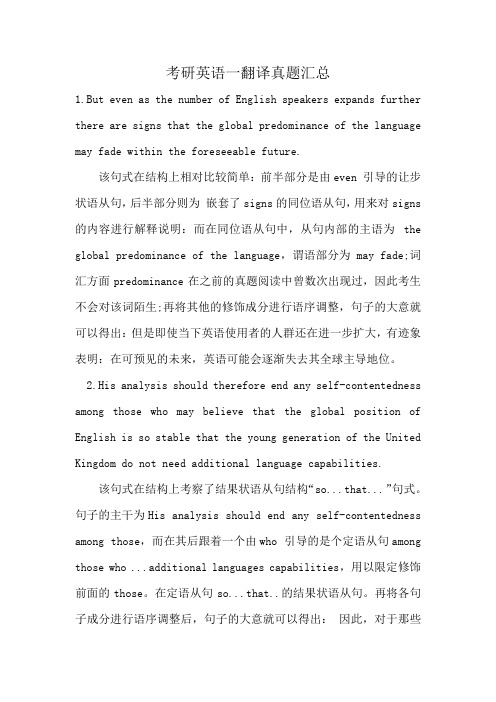
考研英语一翻译真题汇总1.But even as the number of English speakers expands further there are signs that the global predominance of the language may fade within the foreseeable future.该句式在结构上相对比较简单:前半部分是由even 引导的让步状语从句,后半部分则为 嵌套了signs的同位语从句,用来对signs 的内容进行解释说明:而在同位语从句中,从句内部的主语为 the global predominance of the language,谓语部分为 may fade;词汇方面predominance在之前的真题阅读中曾数次出现过,因此考生不会对该词陌生;再将其他的修饰成分进行语序调整,句子的大意就可以得出:但是即使当下英语使用者的人群还在进一步扩大,有迹象表明:在可预见的未来,英语可能会逐渐失去其全球主导地位。
2.His analysis should therefore end any self-contentedness among those who may believe that the global position of English is so stable that the young generation of the United Kingdom do not need additional language capabilities.该句式在结构上考察了结果状语从句结构 so...that...”句式。
句子的主干为His analysis should end any self-contentedness among those,而在其后跟着一个由who 引导的是个定语从句among those who ...additional languages capabilities,用以限定修饰前面的those。
考研英语历年翻译真题

一. 1980考研英语翻译真题及答案Section VI Chinese-English Translation将下列句子译成英语:(本大题共20分,第1题2分,其余各题均3分)Section VI: Chinese-English Translation (20 points)1.水一煮沸请立即把开关关掉。
1. Please turn off the switch (switch off) as soon as the water boils.2. 在八十年代,中国人民将以更大的步伐向前迈进。
2. The Chinese people will forge ahead (march on, march onward, march forward) with greater strides in 1980’s.3. 我们都同意李同志已作出的决定。
3. We all agree to the decision comrade Li has made (made).4. 这个结果比我们预期的要好得多。
4. The result is much (far) better than we expected.5. 在过去的三年中,在恢复我国国民经济方面做了大量的工作。
5. During the past three years a lot (of work) has been done in the recovery (restoration) of our national economy (in recovering our national economy; in restoring our national economy).6. 我们把英语作为学习西方先进科学技术的一种工具。
6. We use English as a tool in learning Western advanced science and technology.7. 没有党的领导,我国的社会主义现代化是不可能实现的。
考研英语一翻译真题及答案

考研英语一翻译真题及答案考研英语一翻译真题Part CDirections:Read the following text carefully and then translate the underlined segments into Chinese. Your translation should be written neatly on the ANSWER SHEET. (10 points)Within the span of a hundred years, in the seventeenth and early eighteenth centuries, a tide of emigration -one of the great folk wanderings of history-swept from Europe to America. (46) This movement,driven by powerful and diverse motivations, built a nation out of a wilderness and, by its nature, shaped the character and destiny of an uncharted continent.(47) The United States is the product of two principal forces-the immigration of European peoples with their varied ideas, customs, and national characteristics and the impact of a new country which modified these traits. Of necessity, colonial America was a projection of Europe. Across the Atlantic came successive groups of Englishmen, Frenchmen,Germans, Scots, Irishmen, Dutchmen, Swedes, and many others who attempted to transplant their habits and traditions to the new world. (48) But, the force of geographic conditions peculiar to America, the interplay of the varied national groups upon one another, and the sheerdifficulty of maintaining old-world ways in a raw, new continent caused significant changes. These changes were gradual and at first scarcely visible. But the result was a new social pattern which, although it resembled European society in many ways, had a character that was distinctly American.(49)The first shiploads of immigrants bound for the territory which is now the United States crossed the Atlantic more than a hundred years after the fifteenth- and sixteenth-century explorations of North America. In the meantime, thriving Spanish colonies had been established in Mexico,the West Indies, and South America. These travelers to North America came in small, unmercifully overcrowded craft. During their six- totwelve-week voyage, they subsisted on meager rations. Many of the ships were lost in storms, many passengers died of disease, and infants rarely survived the journey. Sometimes tempests blew the vessels far off their course, and often calm brought interminable delay.To the anxious travelers the sight of the American shore brought almost inexpressible relief. Said one chronicler,“ The air at twelve leagues distance smelt as sweet as a new-blown garden.” The colonists first glimpse of the new land was a vista of dense woods. (50) The virgin forest with its richness and variety of trees was a real treasure-house which extended from Maine all the way down to Georgia in the south. Here was abundant fuel and lumber. Here was the raw material of houses and furniture, ships and potash, dyes and naval stores.考研英语一翻译真题参考答案:46.在多种强大的动机驱动下,这次运动在一片荒野上建起了一个国家,其本身塑造了一个未知大陆的性格和命运。
考研英语历年翻译真题试卷.doc

一 . 1980考研英语翻译真题及答案Section VI Chinese-English Translation将下列句子译成英语:(本大题共20 分,第 1 题 2 分,其余各题均 3 分)Section VI: Chinese-English Translation (20 points)1.水一煮沸请立即把开关关掉。
1.Please turn off the switch (switch off) as soon as the water boils.2.在八十年代,中国人民将以更大的步伐向前迈进。
2. The Chinese people will forge ahead (march on, march onward, march forward) with greater strides in 1980’ s.3.我们都同意李同志已作出的决定。
3.We all agree to the decision comrade Li has made (made).4.这个结果比我们预期的要好得多。
4.The result is much (far) better than we expected.5.在过去的三年中,在恢复我国国民经济方面做了大量的工作。
5.During the past three years a lot (of work) has been done in the recovery (restoration) of our national economy (in recovering our national economy; in restoring our national economy).6.我们把英语作为学习西方先进科学技术的一种工具。
6.We use English as a tool in learning Western advanced science andtechnology.7.没有党的领导,我国的社会主义现代化是不可能实现的。
考研英语历年翻译真题解析_1990-2007
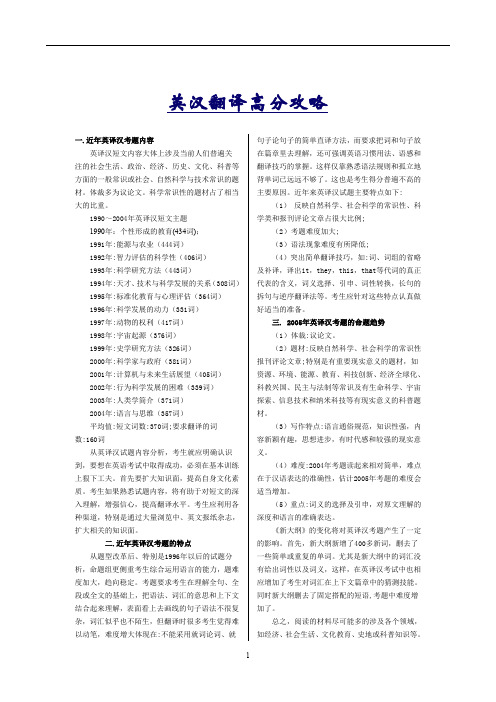
英汉翻译高分攻略一.近年英译汉考题内容英译汉短文内容大体上涉及当前人们普遍关注的社会生活、政治、经济、历史、文化、科普等方面的一般常识或社会、自然科学与技术常识的题材。
体裁多为议论文。
科学常识性的题材占了相当大的比重。
1990~2004年英译汉短文主题1990年:个性形成的教育(434词);1991年:能源与农业(444词)1992年:智力评估的科学性(406词)1993年:科学研究方法(443词)1994年:天才、技术与科学发展的关系(308词)1995年:标准化教育与心理评估(364词)1996年:科学发展的动力(331词)1997年:动物的权利(417词)1998年:宇宙起源(376词)1999年:史学研究方法(326词)2000年:科学家与政府(381词)2001年:计算机与未来生活展望(405词)2002年:行为科学发展的困难(339词)2003年:人类学简介(371词)2004年:语言与思维(357词)平均值:短文词数:370词;要求翻译的词数:160词从英译汉试题内容分析,考生就应明确认识到,要想在英语考试中取得成功,必须在基本训练上狠下工夫。
首先要扩大知识面,提高自身文化素质。
考生如果熟悉试题内容,将有助于对短文的深入理解,增强信心,提高翻译水平。
考生应利用各种渠道,特别是通过大量浏览中、英文报纸杂志,扩大相关的知识面。
二.近年英译汉考题的特点从题型改革后、特别是1996年以后的试题分析,命题组更侧重考生综合运用语言的能力,题难度加大,趋向稳定。
考题要求考生在理解全句、全段或全文的基础上,把语法、词汇的意思和上下文结合起来理解,表面看上去画线的句子语法不很复杂,词汇似乎也不陌生,但翻译时很多考生觉得难以动笔,难度增大体现在:不能采用就词论词、就句子论句子的简单直译方法,而要求把词和句子放在篇章里去理解,还可强调英语习惯用法、语感和翻译技巧的掌握。
这样仅靠熟悉语法规则和孤立地背单词已远远不够了。
考研英语历年翻译真题及译文(共44篇)

一. 1980考研英语翻译真题及答案Section VI Chinese-English Translation将下列句子译成英语:(本大题共20分,第1题2分,其余各题均3分)Section VI: Chinese-English Translation (20 points)1.水一煮沸请立即把开关关掉。
1. Please turn off the switch (switch off) as soon as the water boils.2. 在八十年代,中国人民将以更大的步伐向前迈进。
2. The Chinese people will forge ahead (march on, march onward, march forward) with greater strides in 1980’s.3. 我们都同意李同志已作出的决定。
3. We all agree to the decision comrade Li has made (made).4. 这个结果比我们预期的要好得多。
4. The result is much (far) better than we expected.5. 在过去的三年中,在恢复我国国民经济方面做了大量的工作。
5. During the past three years a lot (of work) has been done in the recovery (restoration) of our national economy (in recovering our national economy; in restoring our national economy).6. 我们把英语作为学习西方先进科学技术的一种工具。
6. We use English as a tool in learning Western advanced science and technology.7. 没有党的领导,我国的社会主义现代化是不可能实现的。
2001-2018年考研英语(一)翻译真题汇总共20页
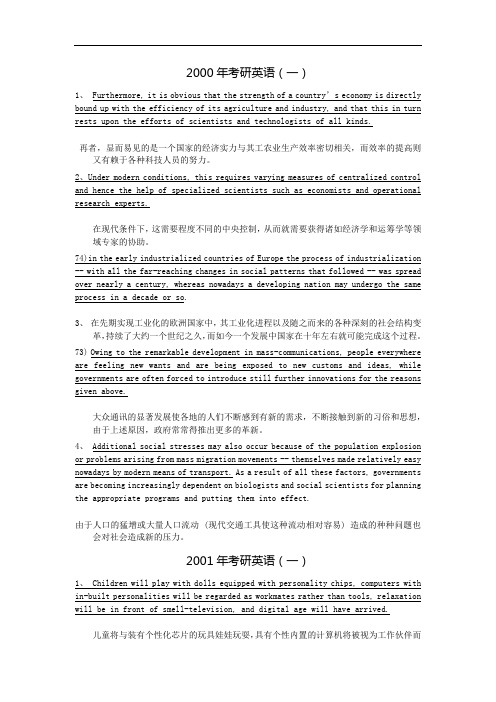
2000年考研英语(一)1、Furthermore, it is obvious that the strength of a country’s economy is directly bound up with the efficiency of its agriculture and industry, and that this in turn rests upon the efforts of scientists and technologists of all kinds.再者,显而易见的是一个国家的经济实力与其工农业生产效率密切相关,而效率的提高则又有赖于各种科技人员的努力。
2、Under modern conditions, this requires varying measures of centralized control and hence the help of specialized scientists such as economists and operational research experts.在现代条件下,这需要程度不同的中央控制,从而就需要获得诸如经济学和运筹学等领域专家的协助。
74)in the early industrialized countries of Europe the process of industrialization -- with all the far-reaching changes in social patterns that followed -- was spread over nearly a century, whereas nowadays a developing nation may undergo the same process in a decade or so.3、在先期实现工业化的欧洲国家中,其工业化进程以及随之而来的各种深刻的社会结构变革,持续了大约一个世纪之久,而如今一个发展中国家在十年左右就可能完成这个过程。
考研英语历年翻译真题
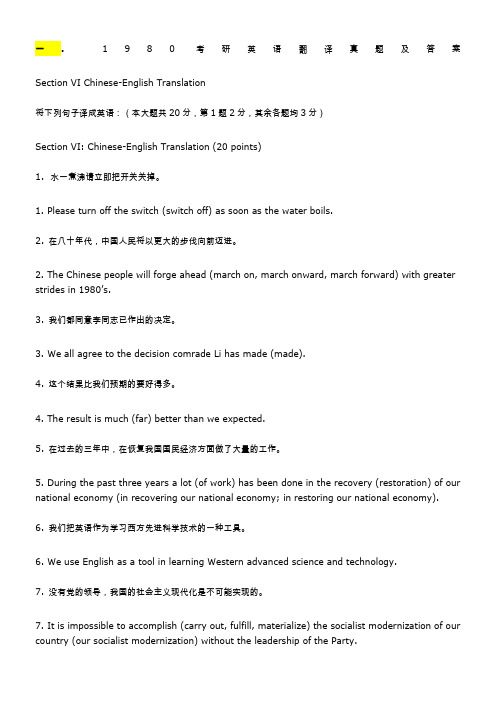
一.1980考研英语翻译真题及答案Section VI Chinese-English Translation将下列句子译成英语:(本大题共20分,第1题2分,其余各题均3分)Section VI: Chinese-English Translation (20 points)1.水一煮沸请立即把开关关掉。
1. Please turn off the switch (switch off) as soon as the water boils.2. 在八十年代,中国人民将以更大的步伐向前迈进。
2. The Chinese people will forge ahead (march on, march onward, march forward) with greater strides in 1980’s.3. 我们都同意李同志已作出的决定。
3. We all agree to the decision comrade Li has made (made).4. 这个结果比我们预期的要好得多。
4. The result is much (far) better than we expected.5. 在过去的三年中,在恢复我国国民经济方面做了大量的工作。
5. During the past three years a lot (of work) has been done in the recovery (restoration) of our national economy (in recovering our national economy; in restoring our national economy).6. 我们把英语作为学习西方先进科学技术的一种工具。
6. We use English as a tool in learning Western advanced science and technology.7. 没有党的领导,我国的社会主义现代化是不可能实现的。
(完整版)考研英语翻译历年真题

1、1994年Directions:Read the following text carefully and then translate the underlined segments into Chinese. Your translation should be written clearly on ANSWER SHEET 2.According to the new school of scientists, technology is an overlooked force in expanding the horizons of scientific knowledge。
(71) Science moves forward, they say, not so much through the insights of great men of genius as because of more ordinary things like improved techniques and tools. (72)”In short" , a leader of the new school contends, "the scientific revolution, as we call it, was largely the improvement and invention and use of a series of instruments that expanded the reach of science in innumerable directions。
”(73)Over the years, tools and technology themselves as a source of fundamental innovation have largely been ignored by historians and philosophers of science. The modern school that hails technology algues that such masters as Galileo, Newton, Maxwell, Einstein, and inventors such as Edison attached great importance to, and derived great benefit from, craft information and technological devices of different kinds that were usable in scientific experiments.The centerpiece of the argument of a technology-yes , genius-no advocate was an analysis of Galileo’ s role a t the start of the scientific revolution。
2003-2015年历年考研英语翻译真题及答案 英语一(可直接打印版)
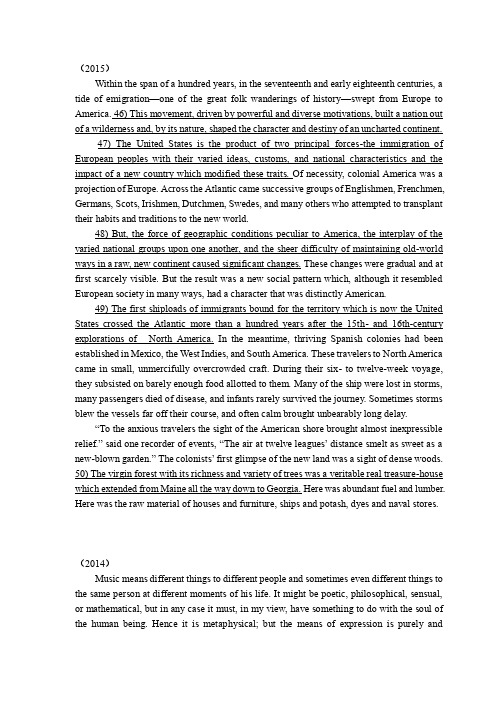
(2015)Within the span of a hundred years, in the seventeenth and early eighteenth centuries, a tide of emigration—one of the great folk wanderings of history—swept from Europe to America. 46) This movement, driven by powerful and diverse motivations, built a nation out of a wilderness and, by its nature, shaped the character and destiny of an uncharted continent.47) The United States is the product of two principal forces-the immigration of European peoples with their varied ideas, customs, and national characteristics and the impact of a new country which modified these traits. Of necessity, colonial America was a projection of Europe. Across the Atlantic came successive groups of Englishmen, Frenchmen, Germans, Scots, Irishmen, Dutchmen, Swedes, and many others who attempted to transplant their habits and traditions to the new world.48) But, the force of geographic conditions peculiar to America, the interplay of the varied national groups upon one another, and the sheer difficulty of maintaining old-world ways in a raw, new continent caused significant changes. These changes were gradual and at first scarcely visible. But the result was a new social pattern which, although it resembled European society in many ways, had a character that was distinctly American.49) The first shiploads of immigrants bound for the territory which is now the United States crossed the Atlantic more than a hundred years after the 15th- and 16th-century explorations of North America. In the meantime, thriving Spanish colonies had been established in Mexico, the West Indies, and South America. These travelers to North America came in small, unmercifully overcrowded craft. During their six- to twelve-week voyage, they subsisted on barely enough food allotted to them. Many of the ship were lost in storms, many passengers died of disease, and infants rarely survived the journey. Sometimes storms blew the vessels far off their course, and often calm brought unbearably long delay.“To the anxious travelers the sight of the American shore brought almost inexpressible relief.” said one recorder of events, “The air at twelve leagues’ distance smelt as sweet as a new-blown garden.” The colonists’ first glimpse of the new land was a sight of de nse woods.50) The virgin forest with its richness and variety of trees was a veritable real treasure-house which extended from Maine all the way down to Georgia. Here was abundant fuel and lumber. Here was the raw material of houses and furniture, ships and potash, dyes and naval stores.(2014)Music means different things to different people and sometimes even different things to the same person at different moments of his life. It might be poetic, philosophical, sensual, or mathematical, but in any case it must, in my view, have something to do with the soul of the human being. Hence it is metaphysical; but the means of expression is purely andexclusively physical: sound. I believe it is precisely this permanent coexistence of metaphysical message through physical means that is the strength of music.46) It is also the reason why when we try to describe music with words, all we can do is articulate our reactions to it, and not grasp music itself.Beethoven’s importance in music has been principally defined by the revolutionary nature of his compositions. He freed music from hitherto prevailing conventions of harmony and structure. Sometimes I feel in his late works a will to break all signs of continuity. The music is abrupt and seemingly disconnected, as in the last piano sonata. In musical expression, he did not feel restrained by the weight of convention. 47) By all accounts he was a freethinking person, and a courageous one, and I find courage an essential quality for the understanding, let alone the performance, of his works.This courageous attitude in fact becomes a requirement for the performers of Beethoven’s music. His compositions demand the performer to show courage, for example in the use of dynamics. 48) Beethoven’s habit of increasing the volume with an extreme intensity and then abruptly following it with a sudden soft passage was only rarely used by composers before him.Beethoven was a deeply political man in the broadest sense of the word. He was not interested in daily politics, but concerned with questions of moral behavior and the larger questions of right and wrong affecting the entire society.49) Especially significant was his view of freedom, which, for him, was associated with the rights and responsibilities of the individual: he advocated freedom of thought and of personal expression.Beethoven’s music tends to move from chaos to order as if order were an imperative of human existence. For him, order does not result from forgetting or ignoring the disorders that plague our existence; order is a necessary development, an improvement that may lead to the Greek ideal of spiritual elevation. It is not by chance that the Funeral March is not the last movement of the Eroica Symphony, but the second, so that suffering does not have the last word. 50) One could interpret much of the work of Beethoven by saying that suffering is inevitable, but the courage to fight it renders life worth living.(2013)It is speculated that gardens arise from a basic need in the individuals who made them: the need for creative expression. There is no doubt that gardens evidence an impossible urge to create, express, fashion, and beautify and that self-expression is a basic human urge; 46) yet when one looks at the photographs of the gardens created by the homeless, it strikes one that, for all their diversity of styles, these gardens speak of various other fundamental urges, beyond that of decoration and creative expression.One of these urges has to do with creating a state of peace in the midst of turbulence, a “still point of the turning world,” to borrow a phrase from T. S. Eliot. 47) A sacred place of peace, however crude it may be, is a distinctly human need, as opposed to shelter, which is a distinctly animal need. This distinction is so much so that where the latter is lacking, as it is for these unlikely gardens, the former becomes all the more urgent. Composure is a state of mind made possible by the structuring of one’s relation to one’s environment. 48) The gardens of the homeless which are in effect homeless gardens introduce form into an urban environment where it either didn’t exist or was not discernible as such. In so doing they give composure to a segment of the inarticulate environment in which they take their stand.Another urge or need that these gardens appear to respond to, or to arise from, is so intrinsic that we are barely ever conscious of its abiding claims on us. When we are deprived of green, of plants, of trees, 49) most of us give in to a demoralization of spirit which we usually blame on some psychological conditions, until one day we find ourselves in garden and feel the oppression vanish as if by magic. In most of the homeless gardens of New York City the actual cultivation of plants is unfeasible, yet even so the compositions often seem to represent attempts to call forth the spirit of plant and animal lift, if only symbolically, through a clumplike arrangement of materials, an introduction of colors, small pools of water, and a frequent presence of petals or leaves as well as of stuffed animals. On display here are various fantasy elements whose reference, at some basic level, seems to be the natural world. 50) It is this implicit or explicit reference to nature that fully justifies the use of word garden, though in a “liberated”sense, to describe these synthetic constructions. In them we can see biophilia—a yearning for contact with nonhuman life—assuming uncanny representational forms.(2012)Since the days of Aristotle, a search for universal principles has characterized the scientific enterprise. In some ways, this quest for commonalities defines science. Newton's laws of motion and Darwinian evolution each bind a host of different phenomena into a single explicatory framework.(46)In physics, one approach takes this impulse for unification to its extreme, and seeksa theory of everything — a single generative equation for all we see. It is becoming less clear, however, that such a theory would be a simplification, given the proliferation of dimensions and universes that it might entail. Nonetheless, unification of sorts remains a major goal. This tendency in the natural sciences has long been evident in the social sciences too.(47)Here, Darwinism seems to offer justification, for if all humans share common origins, it seems reasonable to suppose that cultural diversity could also be traced to more constrainedbeginnings. Just as the bewildering variety of human courtship rituals might all be considered to be forms of sexual selection, perhaps the world's languages, music, social and religious customs and even history are governed by universal features. (48)To filter out what is unique from what is shared might enable us to understand how complex cultural behaviour arose and what guides it in evolutionary or cognitive terms.That, at least, is the hope. But a comparative study of linguistic traits published online today supplies a reality check. Russell Gray at the University of Auckland and his colleagues consider the evolution of grammars in the light of two previous attempts to find universality in language.The most famous of these efforts was initiated by Noam Chomsky, who postulated that humans are born with an innate language-acquisition capacity that dictates a universal grammar. A few generative rules are then sufficient to unfold the entire fundamental structure of a language, which is why children can learn it so quickly.(49)The second, by Joshua Greenberg, takes a more empirical approach to universality, identifying traits (particularly in word order) shared by many languages, which are considered to represent biases that result from cognitive constraints.Gray and his colleagues have put them to the test by examining four family trees that between them represent more than 2,000 languages. (50) Chomsky’s grammar should show patterns of language change that are independent of the family tree or the pathway tracked through it, whereas Greenbergian universality predicts strong co-dependencies between particular types of word-order relations. Neither of these patterns is borne out by the analysis, suggesting that the structures of the languages are lineage-specific and not governed by universals.(2011)With its theme that “Mind is the master weaver,” creating our inner chara cter and outer circumstances, the book As a Man Thinking by James Allen is an in-depth exploration of the central idea of self-help writing.(46) Allen’s contribution was to take an assumption we all share-that because we are not robots we therefore control our thoughts-and reveal its erroneous nature. Because most of us believe that mind is separate from matter, we think that thoughts can be hidden and made powerless; this allows us to think one way and act another. However, Allen believed that the unconscious mind generates as much action as the conscious mind, and (47) while we may be able to sustain the illusion of control through the conscious mind alone, in reality we are continually faced with a question: “Why cannot I make myself do this or achieve that? ”Since desire and will are damaged by the presence of thoughts that do not accord with desire, Allen concluded : “ W e do not attract what we want, but what we are.” Achievement happens because you as a person embody the external achievement; you don’t “ get” success but become it. There is no gap between mind and matter.Part of the fame of Allen’s book is its contention that “Circumstanc es do not make a person, they reveal him.” (48) This seems a justification for neglect of those in need, and a rationalization of exploitation, of the superiority of those at the top and the inferiority of those at the bottom.This ,however, would be a knee-jerk reaction to a subtle argument. Each set of circumstances, however bad, offers a unique opportunity for growth. If circumstances always determined the life and prospects of people, then humanity would never have progressed. In fat, (49)circumstances seem to be designed to bring out the best in us and if we feel that we have been “wronged” then we are unlikely to begin a conscious effort to escape from our situation .Nevertheless, as any biographer knows, a person’s early l ife and its conditions are often the greatest gift to an individual.The sobering aspect of Allen’s book is that we have no one else to blame for our present condition except ourselves. (50) The upside is the possibilities contained in knowing that everything is up to us; where before we were experts in the array of limitations, now we become authorities of what is possible.(2010)One basic weakness in a conservation system based wholly on economic motives is that most members of the land community have no economic value. Yet these creatures are members of the biotic community and, if its stability depends on its integrity, they are entitled to continuance.When one of these noneconomic categories is threatened and, if we happen to love it .We invert excuses to give it economic importance. At the beginning of century songbirds were supposed to be disappearing. (46) Scientists jumped to the rescue with some distinctly shaky evidence to the effect that insects would eat us up if birds failed to control them. the evidence had to be economic in order to be valid.It is painful to read these round about accounts today. We have no land ethic yet, (47) but we have at least drawn near the point of admitting that birds should continue as a matter of intrinsic right, regardless of the presence or absence of economic advantage to us.A parallel situation exists in respect of predatory mammals and fish-eating birds. (48) Time was when biologists somewhat over worded the evidence that these creatures preserve the health of game by killing the physically weak, or that they prey only on "worthless"species.Some species of tree have been read out of the party by economics-minded foresters because they grow too slowly, or have too low a sale vale to pay as timber crops. (49) In Europe, where forestry is ecologically more advanced, the non-commercial tree species are recognized as members of native forest community, to be preserved as such, within reason.To sum up: a system of conservation based solely on economic self-interest is hopelessly lopsided. (50) It tends to ignore, and thus eventually to eliminate, many elements in the land community that lack commercial value, but that are essential to its healthy functioning. It assumes, falsely, I think, that the economic parts of the biotic clock will function without the uneconomic parts.(2009)There is a marked difference between the education which everyone gets from living with others, and the deliberate educating of the young. In the former case the education is incidental; it is natural and important, but it is not the express reason of the association. (46) It may be said that the measure of the worth of any social institution is its effect in enlarging and improving experience; but this effect is not a part of its original motive. Religious associations began, for example, in the desire to secure the favor of overruling powers and to ward off evil influences; family life in the desire to gratify appetites and secure family perpetuity; systematic labor, for the most part, because of enslavement to others, etc. (47) Only gradually was the by-product of the institution noted, and only more gradually still was this effect considered as a directive factor in the conduct of the institution. Even today, in our industrial life, apart from certain values of industriousness and thrift, the intellectual and emotional reaction of the forms of human association under which the world's work is carried on receives little attention as compared with physical output.But in dealing with the young, the fact of association itself as an immediate human fact, gains in importance. (48) While it is easy to ignore in our contact with them the effect of our acts upon their disposition, it is not so easy as in dealing with adults. The need of training is too evident; the pressure to accomplish a change in their attitude and habits is too urgent to leave these consequences wholly out of account. (49) Since our chief business with them is to enable them to share in a common life we cannot help considering whether or no we are forming the powers which will secure this ability.If humanity has made some headway in realizing that the ultimate value of every institution is its distinctively human effect we may well believe that this lesson has been learned largely through dealings with the young.(50) W e are thus led to distinguish, within the broad educational process which we have been so far considering, a more formal kind of education -- that of direct tuition or schooling.In undeveloped social groups, we find very little formal teaching and training. These groups mainly rely for instilling needed dispositions into the young upon the same sort of association which keeps the adults loyal to their group.(2008)Is it true that the American intellectual is rejected and considered of no account in his society? I am going to suggest that it is not true. Father Bruckberger told part of the story when he observed that it is the intellectuals who have rejected America. But they have done more than that. They have grown dissatisfied with the role of intellectual. It is they, not America, who have become anti-intellectual.First, the object of our study pleads for definition. What is an intellectual? 46) I shall define him as an individual who has elected as his primary duty and pleasure in life the activity of thinking in a Socratic (苏格拉底) way about moral problems. He explores such problems consciously, articulately, and frankly, first by asking factual questions, then by asking moral questions, finally by suggesting action which seems appropriate in the light of the factual and moral information which he has obtained. 47) His function is analogous to that of a judge, who must accept the obligation of revealing in as obvious a manner as possible the course of reasoning which led him to his decision.This definition excludes many individuals usually referred to as intellectuals -- the average scientist, for one. 48) I have excluded him because, while his accomplishments may contribute to the solution of moral problems, he has not been charged with the task of approaching any but the factual aspects of those problems. Like other human beings, he encounters moral issues even in the everyday performance of his routine duties -- he is not supposed to cook his experiments, manufacture evidence, or doctor his reports. 49) But his primary task is not to think about the moral code which governs his activity, any more than a businessman is expected to dedicate his energies to an exploration of rules of conduct in business. During most of his waking life he will take his code for granted, as the businessman takes his ethics.The definition also excludes the majority of teachers, despite the fact that teaching has traditionally been the method whereby many intellectuals earn their living. 50) They may teach very well and more than earn their salaries, but most of them make little or no independent reflections on human problems which involve moral judgment. This description even fits the majority of eminent scholars. Being learned in some branch of human knowledge is one thing, living in "public and illustrious thoughts,” as Emerson would say, is something else.(2007)The study of law has been recognized for centuries as a basic intellectual discipline in European universities. However, only in recent years has it become a feature of undergraduate programs in Canadian universities. (46) Traditionally, legal learning has been viewed in such institutions as the special preserve of lawyers, rather than a necessary part of the intellectual equipment of an educated person. Happily, the older and more continental view of legal education is establishing itself in a number of Canadian universities and some have even begun to offer undergraduate degrees in law.If the study of law is beginning to establish itself as part and parcel of a general education, its aims and methods should appeal directly to journalism educators. Law is a discipline which encourages responsible judgment. On the one hand, it provides opportunities to analyze such ideas as justice, democracy and freedom. (47) On the other, it links these concepts to everyday realities in a manner which is parallel to the links journalists forge on a daily basis as they cover and comment on the news. For example, notions of evidence and fact, of basic rights and public interest are at work in the process of journalistic judgment and production just as in courts of law. Sharpening judgment by absorbing and reflecting on law is a desirable component of a journalist’s intellectual preparation for his or her career.(48) But the idea that the journalist must understand the law more profoundly than an ordinary citizen rests on an understanding of the established conventions and special responsibilities of the news media. Politics or, more broadly, the functioning of the state, is a major subject for journalists. The better informed they are about the way the state works, the better their reporting will be. (49) In fact, it is difficult to see how journalists who do not have a clear grasp of the basic features of the Canadian Constitution can do a competent job on political stories.Furthermore, the legal system and the events which occur within it are primary subjects for journalists. While the quality of legal journalism varies greatly, there is an undue reliance amongst many journalists on interpretations supplied to them by lawyers. (50) While comment and reaction from lawyers may enhance stories, it is preferable for journalists to rely on their own notions of significance and make their own judgments. These can only come from a well-grounded understanding of the legal system.(2006)Is it true that the American intellectual is rejected and considered of no account in his society? I am going to suggest that it is not true. Father Bruckberger told part of the story when he observed that it is the intellectuals who have rejected America. But they have done more than that. They have grown dissatisfied with the role of intellectual. It is they, notAmerica, who have become anti-intellectual.First, the object of our study pleads for definition. What is an intellectual? 46) I shall define him as an individual who has elected as his primary duty and pleasure in life the activity of thinking in a Socratic (苏格拉底) way about moral problems. He explores such problems consciously, articulately, and frankly, first by asking factual questions, then by asking moral questions, finally by suggesting action which seems appropriate in the light of the factual and moral information which he has obtained. 47) His function is analogous to that of a judge, who must accept the obligation of revealing in as obvious a manner as possible the course of reasoning which led him to his decision.This definition excludes many individuals usually referred to as intellectuals -- the average scientist, for one. 48) I have excluded him because, while his accomplishments may contribute to the solution of moral problems, he has not been charged with the task of approaching any but the factual aspects of those problems. Like other human beings, he encounters moral issues even in the everyday performance of his routine duties -- he is not supposed to cook his experiments, manufacture evidence, or doctor his reports. 49) But his primary task is not to think about the moral code which governs his activity, any more than a businessman is expected to dedicate his energies to an exploration of rules of conduct in business. During most of his waking life he will take his code for granted, as the businessman takes his ethics.The definition also excludes the majority of teachers, despite the fact that teaching has traditionally been the method whereby many intellectuals earn their living. 50) They may teach very well and more than earn their salaries, but most of them make little or no independent reflections on human problems which involve moral judgment. This description even fits the majority of eminent scholars. Being learned in some branch of human knowledge is one thing, living in "public and illustrious thoughts,” as Emerson would say, is something else.(2005)It is not easy to talk about the role of the mass media in this overwhelmingly significant phase in European history. History and news become confused, and one’s impressions tend to be a mixture of skepticism and optimism. 46) Television is one of the means by which these feelings are created and conveyed -- and perhaps never before has it served so much to connect different peoples and nations as in the recent events in Europe. The Europe that is now forming cannot be anything other than its peoples, their cultures and national identities. With this in mind we can begin to analyze the European television scene. 47) In Europe, as elsewhere, multi-media groups have been increasingly successful: groups which bringtogether television, radio, newspapers, magazines and publishing houses that work in relation to one another. One Italian example would be the Berlusconi group, while abroad Maxwell and Murdoch come to mind.Clearly, only the biggest and most flexible television companies are going to be able to compete in such a rich and hotly-contested market. 48) This alone demonstrates that the television business is not an easy world to survive in, a fact underlined by statistics that show that out of eighty European television networks, no less than 50% took a loss in 1989.Moreover, the integration of the European community will oblige television companies to cooperate more closely in terms of both production and distribution.49) Creating a “European identity”that respects the different cultures and traditions which go to make up the connecting fabric of the Old Continent is no easy task and demands a strategic choice -- that of producing programs in Europe for Europe. This entails reducing our dependence on the North American market, whose programs relate to experiences and cultural traditions which are different from our own.In order to achieve these objectives, we must concentrate more on co-productions, the exchange of news, documentary services and training. This also involves the agreements between European countries for the creation of a European bank for Television Production which, on the model of the European Investments Bank, will handle the finances necessary for production costs. 50) In dealing with a challenge on such a scale, it is no exaggeration to say “Unit ed we stand, di vided we fall” -- and if I had to choose a slogan it would be “Unity in our diversity.”A unity of objectives that nonetheless respect the varied peculiarities of each country.(2004)The relation of language and mind has interested philosophers for many centuries. 61) The Greeks assumed that the structure of language had some connection with the process of thought, which took root in Europe long before people realized how diverse languages could be.Only recently did linguists begin the serious study of languages that were very different from their own. Two anthropologist-linguists, Franz Boas and Edward Sapir, were pioneers in describing many native languages of North and South America during the first half of the twentieth century. 62) We are obliged to them because some of these languages have since vanished, as the peoples who spoke them died out or became assimilated and lost their native languages. Other linguists in the earlier part of this century, however, who were less eager to deal with bizarre data from “exotic” language, were not always so grateful. 63) The newly described languages were often so strikingly different from the well studied languages of。
考研英语翻译试题真题.doc
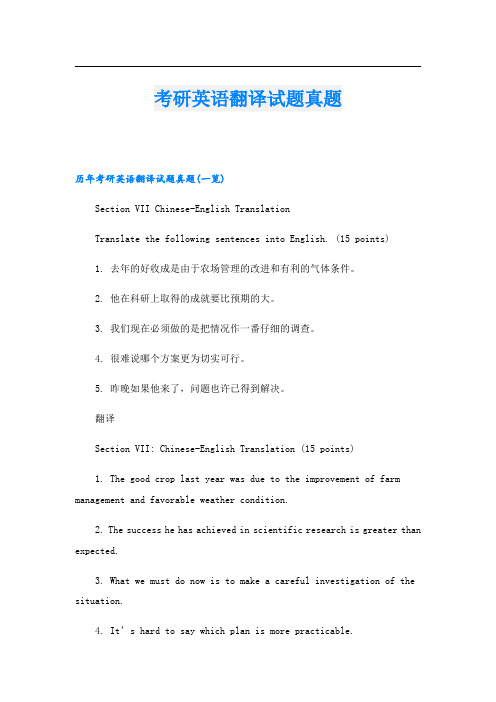
考研英语翻译试题真题历年考研英语翻译试题真题(一览)Section VII Chinese-English TranslationTranslate the following sentences into English. (15 points)1. 去年的好收成是由于农场管理的改进和有利的气体条件。
2. 他在科研上取得的成就要比预期的大。
3. 我们现在必须做的是把情况作一番仔细的调查。
4. 很难说哪个方案更为切实可行。
5. 昨晚如果他来了,问题也许已得到解决。
翻译Section VII: Chinese-English Translation (15 points)1. The good crop last year was due to the improvement of farm management and favorable weather condition.2. The success he has achieved in scientific research is greater than expected.3. What we must do now is to make a careful investigation of the situation.4. It’s hard to say which plan is more practicable.5. If he had come yesterday evening, the question might have been solved.Section VIII English-Chinese TranslationTranslate the following passage into Chinese. Only the underlined sentences are to be translated. (20 points)It would be interesting to discover how many young people go to university without any clear idea of what they are going to do afterwards.(1) If one considers the enormous variety of courses offered, it is not hard to see how difficult it is for a student to select the course most suited to his interests and abilities.(2) If a student goes to university to acquire a broader perspective of life, to enlarge his ideas and to learn to think for himself, he will undoubtedly benefit.(3) Schools often have too restricting an atmosphere, with its time tables and disciplines, to allow him much time for independent assessment of the work he is asked to do.(4) Most students would, I believe, profit by a year of such exploration of different academic studies, especially those “all rounders”with no particular interest. They should have longer time to decide in what subject they want to take their degrees, so that in later life, they do not look back and say, “I should like to have been an archaeologist. If I hadn’t taken a degree in Modern Languages, I shouldn’t have ended up as an interpreter, but it’s too late now. I couldn’t go back and begin all over again.”(5) There is, of course, another side to the question of how to make the best use of one’s time at university.(6) This is the case of the student who excels in a particular branch of learning.(7) He is immediately accepted by the University of his choice, and spends his three or four years becoming a specialist, emerging with a first-class Honour Degree and very little knowledge of what the rest of the world is all about.(8) It therefore becomes more and more important that, if students are not to waste their opportunities, there will have to be much more detailed information about courses and more advice. Only in this way can we be sure that we are not to have, on the one hand, a band of specialists ignorant of anything outside of their own subject, and on the other hand, an ever increasing number of graduates qualified in subjects for which there is little or no demand in the working world.翻译Section VIII: English-Chinese Translation (20 points)1. 如果想一想那些为学生设置的门类繁多的课程,我们就不难发现,对一个学生来说,要选一门符合他的兴趣和能力的课程是多么困难。
考研英语历年翻译真题及译文
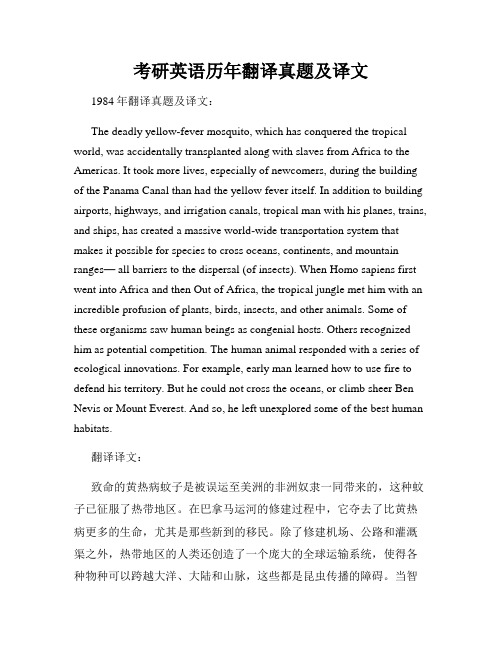
考研英语历年翻译真题及译文1984年翻译真题及译文:The deadly yellow-fever mosquito, which has conquered the tropical world, was accidentally transplanted along with slaves from Africa to the Americas. It took more lives, especially of newcomers, during the building of the Panama Canal than had the yellow fever itself. In addition to building airports, highways, and irrigation canals, tropical man with his planes, trains, and ships, has created a massive world-wide transportation system that makes it possible for species to cross oceans, continents, and mountain ranges— all barriers to the dispersal (of insects). When Homo sapiens first went into Africa and then Out of Africa, the tropical jungle met him with an incredible profusion of plants, birds, insects, and other animals. Some of these organisms saw human beings as congenial hosts. Others recognized him as potential competition. The human animal responded with a series of ecological innovations. For example, early man learned how to use fire to defend his territory. But he could not cross the oceans, or climb sheer Ben Nevis or Mount Everest. And so, he left unexplored some of the best human habitats.翻译译文:致命的黄热病蚊子是被误运至美洲的非洲奴隶一同带来的,这种蚊子已征服了热带地区。
英译汉考研英语一历年真题
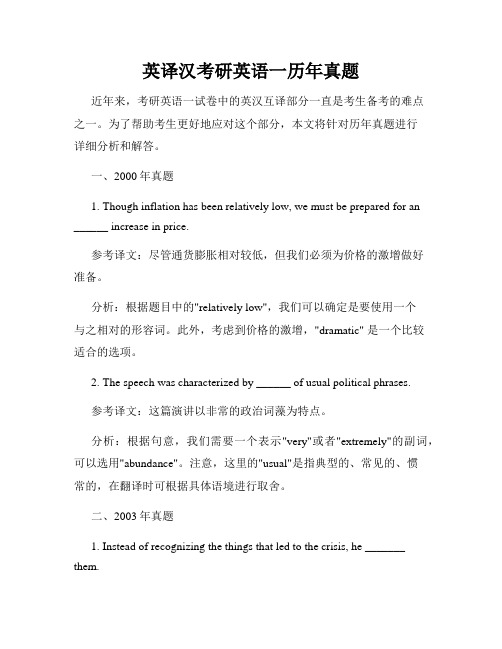
英译汉考研英语一历年真题近年来,考研英语一试卷中的英汉互译部分一直是考生备考的难点之一。
为了帮助考生更好地应对这个部分,本文将针对历年真题进行详细分析和解答。
一、2000年真题1. Though inflation has been relatively low, we must be prepared for an______ increase in price.参考译文:尽管通货膨胀相对较低,但我们必须为价格的激增做好准备。
分析:根据题目中的"relatively low",我们可以确定是要使用一个与之相对的形容词。
此外,考虑到价格的激增,"dramatic" 是一个比较适合的选项。
2. The speech was characterized by ______ of usual political phrases.参考译文:这篇演讲以非常的政治词藻为特点。
分析:根据句意,我们需要一个表示"very"或者"extremely"的副词,可以选用"abundance"。
注意,这里的"usual"是指典型的、常见的、惯常的,在翻译时可根据具体语境进行取舍。
二、2003年真题1. Instead of recognizing the things that led to the crisis, he _______ them.参考译文:与其承认导致危机的事物,他选择了忽视它们。
分析:在翻译中,我们可以使用"ignore"或者"overlook"来表示"忽视"。
注意,"them"指代的是导致危机的事物,我们需要在翻译时保持上下文的一致性。
2. The economic recession has ________ the unemployment rate in this country.参考译文:经济衰退使得这个国家的失业率增加了。
考研英语历年翻译真题

一. 1980考研英语翻译真题及答案Section VI Chinese-English Translation将下列句子译成英语:(本大题共20分,第1题2分,其余各题均3分)Section VI: Chinese-English Translation (20 points)1.水一煮沸请立即把开关关掉。
1. Please turn off the switch (switch off) as soon as the water boils.2. 在八十年代,中国人民将以更大的步伐向前迈进。
2. The Chinese people will forge ahead (march on, march onward, march forward) with greater strides in 1980’s.3. 我们都同意李同志已作出的决定。
3. We all agree to the decision comrade Li has made (made).4. 这个结果比我们预期的要好得多。
4. The result is much (far) better than we expected.5. 在过去的三年中,在恢复我国国民经济方面做了大量的工作。
5. During the past three years a lot (of work) has been done in the recovery (restoration) of our national economy (in recovering our national economy; in restoring our national economy).6. 我们把英语作为学习西方先进科学技术的一种工具。
6. We use English as a tool in learning Western advanced science and technology.7. 没有党的领导,我国的社会主义现代化是不可能实现的。
大学英语考研试题翻译—英译汉及答案
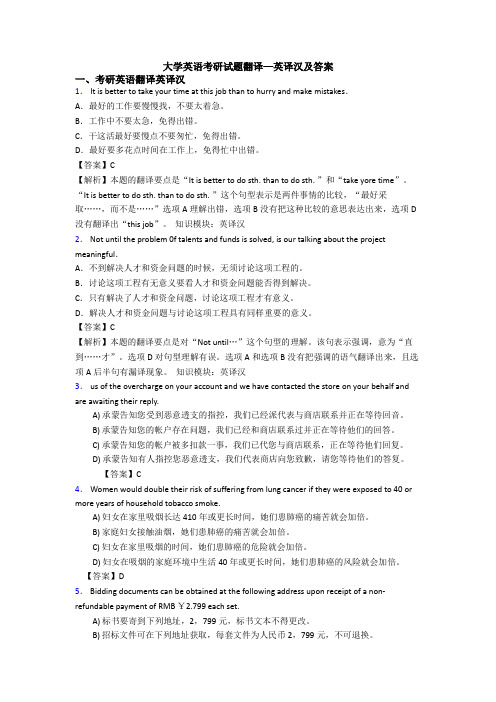
大学英语考研试题翻译—英译汉及答案一、考研英语翻译英译汉1. It is better to take your time at this job than to hurry and make mistakes.A.最好的工作要慢慢找,不要太着急。
B.工作中不要太急,免得出错。
C.干这活最好要慢点不要匆忙,免得出错。
D.最好要多花点时间在工作上,免得忙中出错。
【答案】C【解析】本题的翻译要点是“It is better to do sth. than to do sth. ”和“take yore time”。
“It is better to do sth. than to do sth. ”这个句型表示是两件事情的比较,“最好采取……,而不是……”选项A理解出错,选项B没有把这种比较的意思表达出来,选项D 没有翻译出“this job”。
知识模块:英译汉2. Not until the problem 0f talents and funds is solved, is our talking about the project meaningful.A.不到解决人才和资金问题的时候,无须讨论这项工程的。
B.讨论这项工程有无意义要看人才和资金问题能否得到解决。
C.只有解决了人才和资金问题,讨论这项工程才有意义。
D.解决人才和资金问题与讨论这项工程具有同样重要的意义。
【答案】C【解析】本题的翻译要点是对“Not until…”这个句型的理解。
该句表示强调,意为“直到……才”。
选项D对句型理解有误。
选项A和选项B没有把强调的语气翻译出来,且选项A后半句有漏译现象。
知识模块:英译汉3. us of the overcharge on your account and we have contacted the store on your behalf and are awaiting their reply.A) 承蒙告知您受到恶意透支的指控,我们已经派代表与商店联系并正在等待回音。
考研英语历年翻译真题

一. 1980 考研英语翻译真题及答案Section VI Chinese-English Translation将下列句子译成英语:(本大题共20 分,第 1 题 2 分,其余各题均 3 分)Section VI: Chinese-English Translation (20 points)1. 水一煮沸请立即把开关关掉。
1. Please turn off the switch (switch off) as soon as the water boils.2. 在八十年代,中国人民将以更大的步伐向前迈进。
2. The Chinese people will forge ahead (march on, march onward, march forward) with greater strides in 1980 ’s.3. 我们都同意李同志已作出的决定。
3. We all agree to the decision comrade Li has made (made).4. 这个结果比我们预期的要好得多。
4. The result is much (far) better than we expected.5. 在过去的三年中,在恢复我国国民经济方面做了大量的工作。
5. During the past three years a lot (of work) has been done in the recovery (restoration) of our national economy (in recovering our national economy; in restoring our national economy).6. 我们把英语作为学习西方先进科学技术的一种工具。
6. We use English as a tool in learning Western advanced science and technology.7. 没有党的领导,我国的社会主义现代化是不可能实现的。
2013全国考研英语(一)翻译真题及解析.doc

2013考研英语(一)翻译真题及解析--中域教育网46. yet when one looks at the photographs of the gardens created by the homeless, it strikes one that, for all their diversity of styles, these gardens speak of various other fundamental urges beyond that of decoration and creative expression.解析考察重点:非谓语动词做后置定语,状语从句,插入语这个句子结构非常清晰:it strikes one that, for all their diversity of styles,these gardens speak of various other fundamental urges beyond that of decoration and creative expression.是主句,其中for all their diversity of styles是插入语。
时间壮语从句yet when one looks at the photographs of the gardens created by the homeless,提前至主句之前,其中created by the homeless 是过去分词短语充当后置定语,用来修饰the gardens。
词汇的识别:句子中的动词looks at,对应的宾语是the photographs of the gardens,因此翻译成“观看”。
句子中created by the homeless对应的宾语是the gardens,因此翻译成“创建、建立”。
句子中的动词speak of对应的宾语是various other fundamental urges,因此翻译成“透露、显示、表明”。
考研英语历年翻译真题

一. 1980考研英语翻译真题及答案Section VI Chinese-English Translation将下列句子译成英语:(本大题共20分,第1题2分,其余各题均3分)Section VI: Chinese-English Translation (20 points)1.水一煮沸请立即把开关关掉。
1. Please turn off the switch (switch off) as soon as the water boils.2. 在八十年代,中国人民将以更大的步伐向前迈进。
2. The Chinese people will forge ahead (march on, march onward, march forward) with greater strides in 1980’s.3. 我们都同意李同志已作出的决定。
3. We all agree to the decision comrade Li has made (made).4. 这个结果比我们预期的要好得多。
4. The result is much (far) better than we expected.5. 在过去的三年中,在恢复我国国民经济方面做了大量的工作。
5. During the past three years a lot (of work) has been done in the recovery (restoration) of our national economy (in recovering our national economy; in restoring our national economy).6. 我们把英语作为学习西方先进科学技术的一种工具。
6. We use English as a tool in learning Western advanced science and technology.7. 没有党的领导,我国的社会主义现代化是不可能实现的。
考研英语英译汉翻译题历年题材一览

英译汉,俗称翻译,在考研英语试卷中虽然只有10分的值数,但是每个理智的考⽣都会同意,倘若我们没有在备考中充分地学到必要的翻译知识,那么我们将会在其它的项⽬⽐如完形填空、阅读理解等中遇到很⼤的困难。
所以,要想使⾃⼰在其它项⽬中取得骄⼈的业绩,就必须从⼀开始重视翻译! 英译汉试题为5⼩题,每题2分,共10分。
在⼀篇约400字的短⽂中有五个划线部分,考⽣应根据上下⽂将各划线部分译成汉语。
要求译⽂准确、完整、通顺。
从测试要求来看,考⽣应能理解原⽂,同时译⽂正确,⽂字通顺,语句符合汉语习惯评分标准规定: 1. 译⽂正确,⽂字通顺,可给满分; 2. 汉语出现错别字,按整篇累计扣分,每4个错别字扣1分; 3. 语句不符合汉语习惯、语序错误、⽤词不当或漏译使句意含糊不清,酌情扣分; 4. 理解完全错误或译⽂混乱不成句,不给分; 5. 如同⼀句出现两种或两种以上正确译法可给分;其中⼀种译法错误,酌情扣分。
题材内容: 所选⽂章的题材涉及科普、社会⽣活、历史、⽂化、政治、经济等⽅⾯的常识性内容,体裁多为议论⽂,也有说明⽂或记叙⽂。
例如: 1994年:关于科学发展; 1995年:关于标准化教育和⼼理测试; 1996年:关于科学研究领域的发展差异; 1997年:关于动物的权利问题; 1998年:关于宇宙起源问题; 1999年:关于历史研究⽅法; 2000年:关于⼯业经济; 2001年:关于科技; 2002年:关于⼈类⾏为科学问题; 2003年:关于⼈类学的问题; 2004年:关于⼈类语⾔与思维问题; 2005年:关于媒体发展对⼈类社会的影响; 2006年:关于美国对知识分⼦的定义问题; 2007年:关于法律学习与媒体的关系响; 2008年:达尔⽂对思维能⼒的看法; 2009年:关于教育种类划分的问题。
所以考⽣平时不仅要阅读专业的英⽂⽂献,同时要⼴泛阅读其它专业的科普⽂献。
只要在学习英语的过程中,注意扩⼤阅读量,拓宽⾃⼰的知识⾯,同时经常进⾏⼀些必要的翻译练习,掌握必要的翻译理论和翻译技巧,提⾼汉语表达能⼒,就不会在考试中束⼿⽆策,⽆从下⼿了。
- 1、下载文档前请自行甄别文档内容的完整性,平台不提供额外的编辑、内容补充、找答案等附加服务。
- 2、"仅部分预览"的文档,不可在线预览部分如存在完整性等问题,可反馈申请退款(可完整预览的文档不适用该条件!)。
- 3、如文档侵犯您的权益,请联系客服反馈,我们会尽快为您处理(人工客服工作时间:9:00-18:30)。
2009年:关于教育种类划分的问题。
所以考生平时不仅要阅读专业的英文文献,同时要广泛阅读其它专业的科普文献。
只要在学习英语的过程中,注意扩大阅读量,拓宽自己的知识面,同时经常进行一些必要的翻译练习,掌握必要的翻译理论和翻译技巧,提高汉语表达能力,就不会在考试中束手无策,无从下手了。
另一方面,从试题来分析,命题组更加注重考察考生综合运用语言的能力。
试题难度加大:要求考生在做题时不能以词定义,孤立理解句子,而是要把词和句子放到上下文章节中加以理解;更加强调对习惯用法和语感的掌握,考生靠单词和语法规则是不可能取得良好成绩的。
不管是主观题还是客观题,考生必须理解全句、全段和全文,将语法、词义和上下文结合起来理解。
